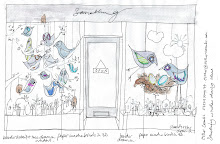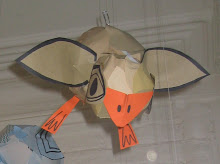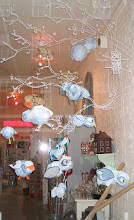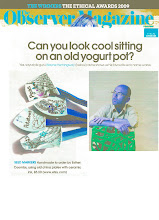Here is another beautiful illustrated fiction post by the wonderful Julia Green. It's a response to the image I recently sent her of a great cake stand I was really pleased with, it had been ordered by a shop and then I smashed it to smithereens while attempting to move from a shelf to my packing table i literally just dropped it form the highest shelf onto brick floor, it didn't have a chance in hell!
But here's a great piece if fiction to make up for its loss!

I was on my fifth salad plate, a tumbler of gin in my other hand, an angry young woman yelling on the stereo, when I realized I no longer existed. Still I wound up and frisbeed the plate across the room, where it momentarily drowned out the music when it crashed against the wall, broke into pieces and crashed to the floor. Admittedly, the plates did not shatter into the million satisfying pieces that I had wanted, that the cartoons and movies had promised me. I didn’t know if this meant we had registered for very good china or very bad china, but I discovered later it was an easy cleanup job—all those big and chunky pieces went right into the dustpan and then doubled trash bags. Even this was a crucial part of my disappearance—I had become a woman who, upon discovering her husband was having an affair, an affair that had begun many many months ago, immediately began drinking and breaking dishes, only to clean them up herself afterward. I slipped into a cliché, a square peg in a square hole, and in becoming a stereotype of a woman scorned, I watched my actual identity—I was a great dancer, but a bad singer, I liked artichokes and beagles and biking, couldn’t stand coconut or musicals—the infinite idiosyncrasies that defined me had dissolved, and I was nobody. I flung another plate at the wall—we never used the china, only bought it because my mother insisted that people register for china—and marveled at how the only thing left that I could control was the trajectory of the plate, the angle and its velocity. The rest was up to man and God.
















